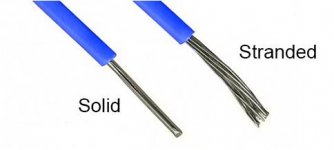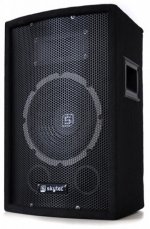What is your speaker impedance?
What is your amplifier to speaker cable length?
What is your amplifier output impedance, across the audio frequency range?
Is your speaker tolerant of variable source impedance?
Think about what answers you might get if your cables were 600mm long into a 16ohms speaker, or 24m long into a 4ohms speaker.
Would you expect similar answers?
Give us/you sufficient information to get close to giving good advice.
What is your amplifier to speaker cable length?
What is your amplifier output impedance, across the audio frequency range?
Is your speaker tolerant of variable source impedance?
Think about what answers you might get if your cables were 600mm long into a 16ohms speaker, or 24m long into a 4ohms speaker.
Would you expect similar answers?
Give us/you sufficient information to get close to giving good advice.
speaker impedance : 8 ohm
amplifier to speaker cable length : about 1,5 meters ( each channel ) and i also wanna know for about 5 meters ( each channel )
amplifier output impedance across the audio frequency range: i dont know, perhaps 3-40 ohm
Is your speaker tolerant of variable source impedance? i dont know
Thank You.
amplifier to speaker cable length : about 1,5 meters ( each channel ) and i also wanna know for about 5 meters ( each channel )
amplifier output impedance across the audio frequency range: i dont know, perhaps 3-40 ohm
Is your speaker tolerant of variable source impedance? i dont know
Thank You.
These tell me to advise you to use any cable you have lying around...............amplifier output impedance across the audio frequency range: i dont know, perhaps 3-40 ohm
Is your speaker tolerant of variable source impedance? i dont know
...........
Whereas
tells me that anything with 0.5sqmm will dospeaker impedance : 8 ohm
amplifier to speaker cable length : about 1,5 meters ( each channel )
and
tells me that >=1sqmm will do.for about 5 meters
Hello,
Good article (IMHO) on speaker wire. FWIW: Speaker Cable Gauge (AWG) Guidelines & Recommendations | Audioholics
Greg
Good article (IMHO) on speaker wire. FWIW: Speaker Cable Gauge (AWG) Guidelines & Recommendations | Audioholics
Greg
When we connect the cables in the speakers and in the amplifiers we should smash the most of little cooper wires that form the wire, that we can, right ? ... Because this will allow that more current passes throu those joints, right ?
Is hard wire ( those malleable wires that actually only exists one thick wire inside the plastic ) good for audio connections ?
Thanks all.
Is hard wire ( those malleable wires that actually only exists one thick wire inside the plastic ) good for audio connections ?
Thanks all.
speaker cables
Hi there J: Use search here in DiyAudio, there is a thread with 14,000 replies answering your question and probably 14,000 different comments. You can learn a lot about speaker cables by reading this thread. ...regards, Michael
....Is hard wire ( those malleable wires that actually only exists one thick wire inside the plastic ) good for audio connections ?Thanks all.
Hi there J: Use search here in DiyAudio, there is a thread with 14,000 replies answering your question and probably 14,000 different comments. You can learn a lot about speaker cables by reading this thread. ...regards, Michael
What do you mean? You need to connect all of the small wires that you have available. Usually twisting them together then screwing them onto a terminal, or soldering to a plug works.we should smash the most of little cooper wires that form the wire
Thick wire is OK too, at about 1mm - 1.5mm dia, but most people don't want rigid wiring to their speakers. There is also a "skin effect" which means that there may be a slight increase in impedance at 20kHz, but is not likely to be great. Using stranded wire with wires less than about 0.5mm dia will eliminate this problem for audio.
" Is hard wire ( those malleable wires that actually only exists one thick wire inside the plastic ) good for audio connections ? "
I mean: Is solid wire good for audio connections ?

... and i mean if we have a normal copper wire ( not solid ) that have many little cooper wires inside the plastic... , when we connect to the speakers or to the amplifier supouse that only 2 or 3 of these little wires are in actually phisical contact with the connector. That will compromise all the rest, even if the wire is thick ?
Thanks all.
I mean: Is solid wire good for audio connections ?

... and i mean if we have a normal copper wire ( not solid ) that have many little cooper wires inside the plastic... , when we connect to the speakers or to the amplifier supouse that only 2 or 3 of these little wires are in actually phisical contact with the connector. That will compromise all the rest, even if the wire is thick ?
Thanks all.
Last edited:
Hi there J: Use search here in DiyAudio, there is a thread with 14,000 replies answering your question and probably 14,000 different comments. You can learn a lot about speaker cables by reading this thread. ...regards, Michael
You can also be misled and confused by people who think speaker wire makes a difference. If the impedance is low enough it dosnt. There's a lot of myth and NO proof.
Short answer:
Solid wire works fine, but it is not practical to use such a stiff cable.
Just use normal stranded copper cable of 2,5 or 1,5mm2. Like this type: Cordial CLS 215 - Thomann UK
There is no advantage to be had by using expensive or special speaker cables.
Edit: good tight connections at the amplifier and loudspeakers are more important than the type of cable. Loose connections = problems.
Solid wire works fine, but it is not practical to use such a stiff cable.
Just use normal stranded copper cable of 2,5 or 1,5mm2. Like this type: Cordial CLS 215 - Thomann UK
There is no advantage to be had by using expensive or special speaker cables.
Edit: good tight connections at the amplifier and loudspeakers are more important than the type of cable. Loose connections = problems.
Last edited:
Speaker wire needs to be thick and closely-spaced. Not too thick to get into the terminals. In most cases it needs to have some flexibility, which probably means stranded rather than solid. It doesn't need to be anything other than copper. It doesn't need to be anything other than fairly cheap. It doesn't have to be woven - in fact this could be a disadvantage. Low resistance and closely-spaced are the only requirements.
Re post #9 - yes, it is no good if stranded wire breaks and only leaves a few strands to make the connection. Be careful when stripping the plastic not to break any wires. You can get some cheap stripping tools that reduce the risk. I have known thick wire to become nicked and then break, too.
The most important points are that the wire resistance needs to be "low enough" and the connections between the amp and speaker nice and solid. "Low enough" does depend on the length of cable, but I would suggest that for an 8 ohm speaker, 0.1 ohms max. would be fine. If the impedance drops to 4 ohms that is still only a loss of 0.2dB.
1mm2 wire (32/0.2=32 strands 0.2mm dia) (6A rating) stranded would be ideal, and at 1.5 meters only 24 milliohms per length.
The most important points are that the wire resistance needs to be "low enough" and the connections between the amp and speaker nice and solid. "Low enough" does depend on the length of cable, but I would suggest that for an 8 ohm speaker, 0.1 ohms max. would be fine. If the impedance drops to 4 ohms that is still only a loss of 0.2dB.
1mm2 wire (32/0.2=32 strands 0.2mm dia) (6A rating) stranded would be ideal, and at 1.5 meters only 24 milliohms per length.
That would require a 4 core cable and any advantage is questionable.Use normal 15 Amp mains wire.The advantage of using a 3 core cable is that the mids / treble speakers can be wired separately from the woofer.
Each signal requires 2 conductors, with a 3 core cable you have to share a core.
Hi Kevin, you are incorrect.
If you speaker - ve terminal is common then use it for 0 volts or earth (green / yellow wire).
The woofer can be connected to Brown wire (live).
The mid / treble to the Blue wire (neutral).
At the amplifier connect the Brown and Blue wires together and connect to the red speaker terminal +'ve.
Idea by no wiring a speaker is the the high current woofer waveform does not interfere with the lower current mid / treble speakers.
This does not apply to amplifiers. Like some bridge amplifiers.
If you speaker - ve terminal is common then use it for 0 volts or earth (green / yellow wire).
The woofer can be connected to Brown wire (live).
The mid / treble to the Blue wire (neutral).
At the amplifier connect the Brown and Blue wires together and connect to the red speaker terminal +'ve.
Idea by no wiring a speaker is the the high current woofer waveform does not interfere with the lower current mid / treble speakers.
This does not apply to amplifiers. Like some bridge amplifiers.
Wire is linear, to a very high degree of approximation. Hence the wire does not mind sharing both woofer and tweeter currents; there is no interference.
What can happen with bi-wiring is a small dip in response near the crossover frequency. This is because at the crossover frequency the phase of the woofer and tweeter currents are such that the vector sum of the two can be smaller than the arithmetic sum, so bi-wiring gives more voltage drop than simply putting the two wires in parallel. This may or may be audible; it may or may not be an improvement, depending on whether the existing system had a small peak near the crossover frequency.
What can happen with bi-wiring is a small dip in response near the crossover frequency. This is because at the crossover frequency the phase of the woofer and tweeter currents are such that the vector sum of the two can be smaller than the arithmetic sum, so bi-wiring gives more voltage drop than simply putting the two wires in parallel. This may or may be audible; it may or may not be an improvement, depending on whether the existing system had a small peak near the crossover frequency.
- Status
- This old topic is closed. If you want to reopen this topic, contact a moderator using the "Report Post" button.
- Home
- General Interest
- Everything Else
- Ideal copper wire
